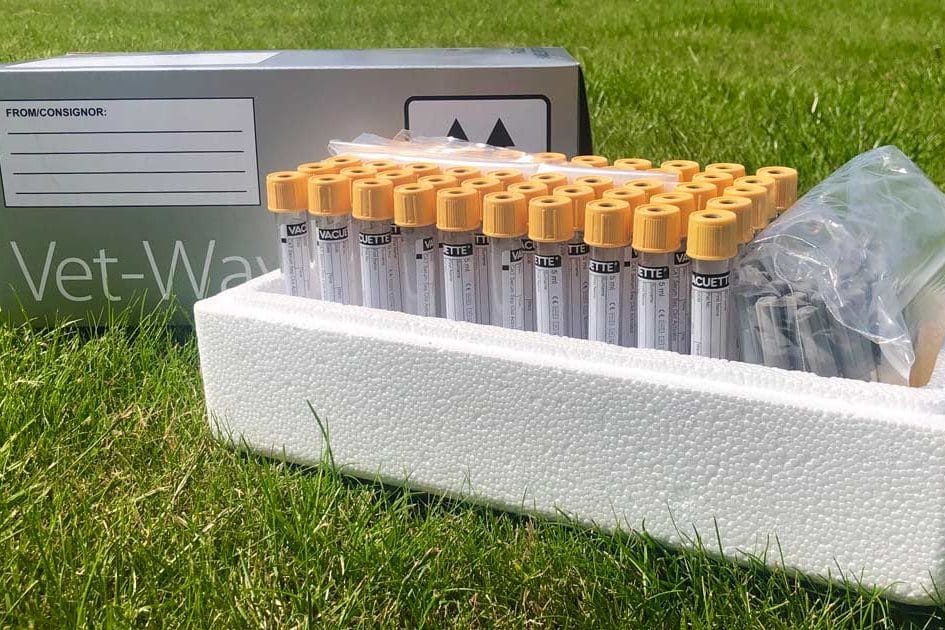Latest Blogs
Vet-Way Field Kits in Herd and Flock Surveillance
The Importance of Flock Surveillance
Whole herd and flock surveillance for infectious disease is becoming an increasing priority for UK livestock from both an animal health and welfare perspective for trade now that we have left the European Union. Trade agreements will heavily rely on proven disease monitoring. In the UK we have nationally recognised schemes such as CHeCs for cattle to monitor highly important infectious diseases. These diseases include Johne’s, Neurospora, Leptospirosis, IBR, BVD and TB for cattle. A large proportion of dairy farmers are now obliged to be part of the “Action Johnes” plan. This is a national Johne’s disease control plan that involves blood sampling at least 30 dairy cows per year or even the whole herd in some cases. In sheep, the nationally monitored infectious diseases are Maedi Visna and scrapie. Many commercial herd and flocks are now undertaking infectious disease monitoring to gain disease-free accreditation or an approved risk level, annual herd level monitoring through serology is usually required.
Cattle herds and sheep flock size have rapidly increased over the years to meet the demands of the commercial market. On some farms, this can involve blood sampling hundreds of animals. Purchasers of stock are becoming more aware of disease status and so a known status can provide a premium at sale. As margins tighten in agriculture, this process needs to be as cost-effective as possible. Not only are there the laboratory fees to consider but also the time fee of the veterinary surgeon sampling the animals. Vet-Way field kits provide an efficient, user-friendly solution to flock surveillance by blood sampling large numbers of cattle and sheep in one session. The kit contains everything the user requires for flock surveillance, from extracting the samples to legal packaging for postage of biological samples conforming with packing instruction 650.
The kits contain 50 vacutainer blood tubes each arranged into rows within a polystyrene holder. We can supply both red and gold top blood tubes. This will keep the samples organised and safe during the session, minimising the risk of samples getting lost or mixed up. The polystyrene holder keeps the tube upright thus facilitating the neat separation of serum. The box will also keep the samples clean and protected. Our blood tubes have an adhered, uniquely barcoded label that is repeated on a sticker that can be peeled off and applied to paperwork meaning that there is no need for ear tags on the tube and you still have a point of reference for each animal. Minimising the need for scribing will make a blood sampling session more efficient, especially in an outdoor system in adverse weather conditions. As well as blood tubes, the Vet-Way field kits also contain 50 vacuette needles and a needle holder to allow ensure each sample is obtained with a clean needle.
Our kits contain everything required for the legal postage of category B biological samples. Each kit contains a piece of absorbent material to place over the samples before placing the polystyrene lid. The polystyrene box protects the samples but also insulates to prevent exposure to extremes in temperature during transport to the laboratory, thus minimising the risk of hemolysis which can affect sample quality. The outer box has labeling with packing instruction 650 but also has labeling boxes for the sender and receiver addresses. A security label is also provided.

Vet’s Viewpoint on Vet-Field Kits for Flock Surveillance
In commercial farm animal practice, a large part of our role in herd and flock health is disease monitoring and flock surveillance. Having spent most of my career in a mainly beef cattle area, I have found that an increasing number of our suckler clients are investing in infectious disease monitoring through national schemes. At housing time when the spring calves are weaned, a large proportion of our time is spent performing pregnancy diagnosis and infectious disease blood testing. Usually, it is more convenient to get these two jobs done on the same visit to avoid two handlings of the pregnant cattle. It can be quite arduous doing two jobs in one session, but the Vet-Way field kits help to keep things efficient. Anyone who has worked with suckler cows knows that it is important to minimise their time in the crush. I have always used Vet-Way field kits as it reduces time spent on paperwork and keeps my samples organised.
Sometimes these sessions can take all day and by the time you finish, the last thing you want to do is organise and package samples correctly. Vet-Way field kits mean all this leg work is already done and the samples are organised as we go. The kits also look very tidy and professional. I usually keep the sleeve in my car and just take the polystyrene box crush side to keep the sleeve clean.
If you’d like to find out more about our Vet-Way field kits and their benefits for flock surveillance, click here.
